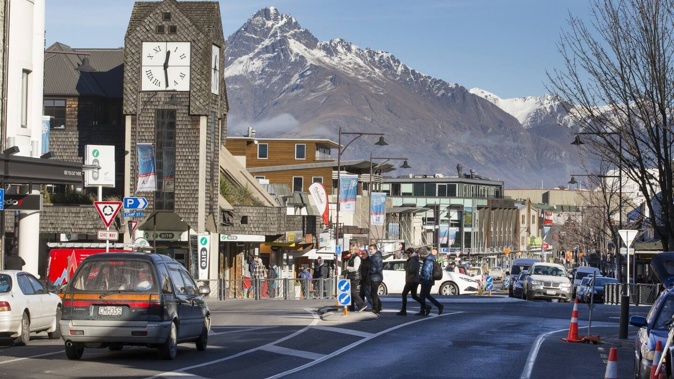
Major tourism operators in Queenstown are reportedly buying empty hotels to house staff, combating the chronic housing shortage in New Zealand’s adventure capital.
The Queenstown Community Housing Trust has confirmed its accommodation waiting list has crossed more than 1300 eligible families this month.
The independent community-owned organisation seeks to provide residents in the district “an opportunity to secure an affordable place to call home”.
 Tourism operators are buying hotels to accommodate staff. Photo / James Allan
Tourism operators are buying hotels to accommodate staff. Photo / James Allan
Chief executive Julie Scott said the situation is at “crisis point” for those struggling to find a suitable roof over their heads in the tourist town, and the list has gone up “literally by hundreds of households in the last year or so”.
She said some big tour operators have purchased empty hotels and hostels for housing workers in, while others have leased existing properties.
“It’s been really positive that we’ve seen businesses stepping into that space and looking after their employees.”
Scott said those sorts of initiatives were relatively commonplace “20, 30, even 40 years ago”, and are now making their way back.
Mayor Glyn Lewers said the wait list “just goes to show the cost-of-living pressures are quite acute” in Queenstown.
He said when he first took office the trust’s list was around 850 families, so “there’s been a fair bit of growth in the last 18 months”.
While some may assume seasonal workers are the ones struggling most to find accommodation in peak snow season, Scott said that is not necessarily the case.
 It's not just seasonal workers struggling to find affordable housing. Long term residents are feeling the squeeze too. Photo / Mark Mitchell
It's not just seasonal workers struggling to find affordable housing. Long term residents are feeling the squeeze too. Photo / Mark Mitchell
She said those on the trust’s list are New Zealand residents or citizens “who are here long-term and are seeking to stay and work in the district”.
Scott said they are families who do not already own property and fit within the trust’s caps of “around $130,000” maximum gross household income annually.
She said many of those people are currently living in rental accommodation, with weekly bills that simply “don’t stack up”.
Anecdotal examples included a three-bedroom home in Lake Hayes which has been rented out for $1100 a week – something Scott described as “absolutely phenomenal”.
Scott said it spoke to a major issue in Queenstown, in which the rental properties that are available are simply unaffordable to the average Kiwi.
The situation is forcing many families into “overcrowding situations”.
Scott believed it reflects New Zealand’s population growth, which is “going through the roof”, with the Queenstown Lakes area significantly higher than other parts of the country.
She acknowledged while there is “no one silver bullet” to tackle the situation, there are several levers that can be pulled to alleviate it.
That includes increasing the amount of land available for housing development, which Scott noted the Government is working on.
The downside to that, however, is what needs to follow – infrastructure.
“Our council and ratepayers simply don’t have the capacity to be paying for the necessary infrastructure to support all the new homes that we need.”
Scott said that would require the Government or another party to come to the table with suitable funding.
Lewers said it is a long-term, ongoing issue.
“I can pull out articles from the 1970s talking about this exact thing”.
He said tackling Queenstown’s housing woes requires a medium-to-long-term focus.
Lewers said it would be a “bit of a hard ask” to build homes quickly in the current market conditions and construction capacity.
He also acknowledged the current Government is “on the right track” in its attempts to incentivise build-to-rent and make it easier to plan and build homes.
However, Lewers made clear his desire for the district council to have “a little bit more say in when that land gets developed” to avoid out-of-sequence planning, “especially if the infrastructure is not there”.
Lewers also noted it would like to weigh in on the typology, mix and density of housing developments.
“Because if you have a look at that waitlist ... the odd thing is that one- and two-bedroom apartments and studios are in demand, compared to your standalone 3-to-4-bedroom house.”
It is seemingly a better housing situation for this year’s seasonal workers, who’ve secured work for the tourist town’s peak-snow season.
The situation proved to be dire last year, with reports that many short-term employees were forced to sleep in their cars due to the chronic housing shortage.
But Lewers said it is a different story this winter.
He said elevated pricing is still an issue, but overall availability is “picking up on both sides of the hill in Queenstown and Wanaka”.
Scott agreed and believed that it is partly down to major operators in the town who took it upon themselves to ensure their staff had a roof over their heads.
Lewers said those businesses are usually the town’s major tourism players and is pleased to see “the big boys step up”.
Although he acknowledged continued staffing difficulties the smaller “mum and dad” operators face, who do not have the resources or capital to undertake such initiatives.
He said it is a “swings and roundabouts” situation, as the major players are trying to do right by their own workers, but “obviously take resource out of the market”.
“I commend what they’ve done, but I have heard of some workers that get priced out when looking for rental accommodation because a business has taken the lease”, Lewers said.
The Queenstown Lakes District Council has also pushed its community Manaaki programme this winter, encouraging locals with a spare room and a desire to earn extra cash to rent it out to a seasonal worker in need.
Scott was full of praise for the initiative, which has the full backing of the trust.
“Unfortunately, I don’t think it’s had quite the pickup that that was desired or envisaged ... but every new room available helps.”
Lewers said it is impossible to tell exactly how many locals have taken the Manaaki approach on board, but website traffic numbers paint a promising picture.
While Queenstown’s housing woes are a long-term issue, community leaders are hopeful the situation will eventually make like the town’s winter snow ... and settle.
Blake Benny is a Christchurch-based reporter with a focus on tourism and social issues, along with general news.
Blake joined Newstalk ZB in 2022, having previously studied Broadcast Journalism at the New Zealand Broadcasting School.
You can contact Blake at [email protected].
Take your Radio, Podcasts and Music with you









